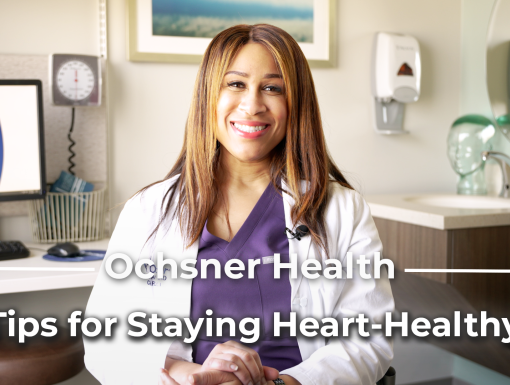
Holiday Heart Health: 5 Tips for a Safe Season
The holiday season is a time for joy, togetherness and celebration, but it can also bring hidden risks to your heart health. Research shows that more heart attacks occur in December and January than at any other time of the year. While the festivities bring cheer, they also tempt us with indulgent food, excessive alcohol and packed schedules that leave little room for self-care. For many, emotional health takes a hit too, with elevated stress and feelings of sadness or isolation contributing to the season's challenges.
The good news is that you can protect your heart and still enjoy the holidays by making simple yet meaningful changes. Here are five practical tips to help you celebrate safely while caring for your heart.
1. Practice moderation with food and drinks
The holidays are synonymous with indulgence — tables overflow with rich foods and celebratory toasts are frequent. While it’s tempting to enjoy every treat, moderation is key. Excessive eating, particularly of high-fat or salty foods, can elevate blood pressure and cholesterol levels, putting unnecessary strain on your heart. Similarly, while moderate alcohol consumption may have some cardiovascular benefits, overindulging can lead to irregular heart rhythms or even a condition known as “holiday heart syndrome.”
Approach holiday meals with balance. Try smaller portions of decadent dishes and fill your plate with healthier options like roasted vegetables, lean proteins and whole grains. Alternate alcoholic drinks with water or sparkling water for hydration and to control your intake. Remember, enjoying the holidays doesn’t mean putting your health at risk.
2. Manage stress to lighten the load on your heart
The holidays are meant to bring happiness, but the reality of busy schedules, financial commitments and family dynamics often creates stress. Chronic stress, especially during this season, can have a serious impact on your heart by increasing blood pressure and triggering unhealthy coping mechanisms like overeating or drinking too much.
To stay grounded amidst the chaos, take time each day to relax and recharge. Whether it’s a short meditation session, a brisk walk or even listening to calming music, small moments of self-care add up. Break bigger tasks like shopping or meal preparation into manageable steps to avoid feeling overwhelmed, and don’t hesitate to ask for help when needed. Keeping your stress levels in check is one of the best gifts you can give yourself this season.
3. Stay active — make movement part of your celebrations
It’s easy for exercise routines to take a backseat during the holidays, but remaining active is important for maintaining heart health. Physical activity helps regulate blood pressure, improves circulation, and boosts mood by releasing endorphins, your body's natural feel-good chemicals.
You don’t need a gym to stay fit during the holidays. Sneak in activity by taking family walks after meals, dancing to festive music, or opting for stairs instead of elevators when shopping. According to Dr. Chip Lavie, even small amounts of activity—2,500 to 3,000 steps daily—can offer health benefits, while the maximum impact is seen between 7,000 and 9,000 steps per day. Find creative ways to incorporate movement into your celebrations, and your heart will thank you.
4. Seek support for depression
While the holidays are often portrayed as a joyous time, not everyone feels that way. Stress, loneliness or unmet expectations can lead to feelings of sadness or depression, all of which can take a toll on your heart health. Depression has been linked to an increased risk of heart disease, primarily because it can lead to poor lifestyle choices like overeating, inactivity or neglecting medications.
If you’re feeling down, don’t keep it to yourself. Talk to a trusted friend or family member about how you’re feeling. If emotions persist, consider reaching out to a healthcare professional for guidance and support. Sometimes, even a simple routine change, like spending time outdoors or practicing gratitude, can help improve your mood and keep seasonal depression at bay.
5. Recognize symptoms of a heart attack
The holidays can distract us from paying attention to our health, but any signs of a heart attack should never be ignored. Symptoms like chest pain, shortness of breath, nausea and profuse sweating may seem subtle but require immediate attention. Women, in particular, may experience atypical symptoms such as fatigue, difficulty sleeping or shortness of breath in the weeks leading up to a heart attack.
Sometimes, out-of-town guests hesitate to seek medical help in unfamiliar locations, but it’s critical to prioritize your health over the convenience of being at home. If you or a loved one experience symptoms, seek emergency care immediately. It’s better to err on the side of caution — healthcare providers would much rather rule out a false alarm than delay treatment for a potentially life-threatening condition.
Prioritize your heart this holiday season
Your heart health is one of your greatest gifts, and with a little mindfulness, you can safeguard it while enjoying all that the holidays have to offer. By eating and drinking in moderation, managing stress, staying active, seeking emotional support and recognizing the signs of a heart attack, you can celebrate safely and responsibly.
Ochsner Health is here to support you during the holidays and beyond. Whether you need guidance on heart-healthy habits or specialized cardiovascular care, our team is ready to partner with you in achieving lifelong health.
This year, give yourself the gift of a healthy heart — because the best celebrations start with wellness.
Learn more about cardiology care at Ochsner.


